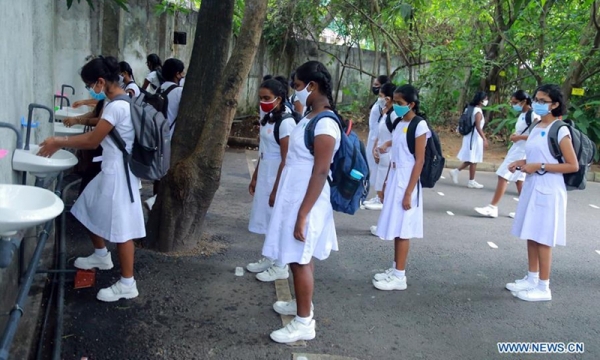Education Forum Sri Lanka calls upon the Ministry of Education Sri Lanka and Provincial Departments of Educaiton to recognize and act on eight points to address issues in the education sector arising from prolonged school closure.
"The school education system in Sri Lanka has been dysfunctional for 15 months. The epidemic has left >50% of students uncontactable and those who are contacted only had content delivered to them over social media like WhatsApp. Only 5% received a real-time online education experience," Sujata Gamage and Tara De Mel, Co-coordinators of the forum, said.
The eight points released by Education Forum is as follows,
"1. Content delivered over TV, WhatsApp or in print form is not education: The archaic transmission mode of education practiced in the Sri Lankan education system came to the fore during COVID-19. Teachers sent PDF files over WhatsApp to parents with smartphones, clogging their phones and forcing them to get pages and pages of notes printed. Learning happens not in transmission but in the engagement of the child with the content under the guidance of a teacher. Teachers need only send instructions to use existing textbooks and workbooks which should have been made available free to students at the beginning of the year. 2. Parents cannot replace teachers. Schools are responsible for keeping home-bound students engaged 730AM-130PM on designated school days: A bi-weekly self-learning plan should be provided for each child and a teacher should follow-up with him/her at least once a day. Ninety six percent of households in Sri Lanka have access to a mobile phone. Teleconferencing is possible with analog phones. There is a teacher for every 16 students on average. There is no excuse for not reaching out to every child.
3. Divisional/Zonal directors should be empowered to support teachers and principals as befits local conditions: Ninety-five present of school education expenditure are taken up by salary payments leaving little for student, teacher, or school development. Schools with wealthier parents raise additional funds but poorer communities are left helpless. Local education authorities know the local requirements best. Funding should be allocated without strings for use by zonal/divisional education directors for targeting locality specific needs.
4. School attendance committees at GND Level should be reactivated to monitor and support home-bound children: Children’s anxieties and mental health issues, abusive homes, poor nutrition are other critical issues. Regulation 1005/5 of 1997 mandated School Attendance Committees comprising of principals, school development society representative, and education health, welfare authorities in each GND to keep track of families with school-age children. These committees should be reactivated immediately.
5. Modalities for opening schools must be in place with decentralized decision-making: Schools in low-risk areas should be allowed to keep open. Even in high-risk areas, principal and teachers in consultation with relevant committees can decide on appropriate school re-opening schedules and isolation modalities. Strategic plans for a more permanent way of keeping schools open should be developed with vaccinations and testing underpinning such plans.
6. Teachers are frontline workers. They should receive priority in vaccination: When health-care-workers are considered as frontline workers deserving immediate vaccination, the same should follow for teachers - considering the education crisis and repercussion of school closures across the society and the economy. 7. Personnel and students in schools in high-risk areas should be tested (RAT) regularly: A cost-effective testing system should be designed, so that teachers and students are tested regularly. If a student or a teacher is tested positive, individual classrooms or groups of students should be isolated, instead of closing the entire school.
8. Blended learning should be adopted as the norm when schools are in session so that teachers and students can transition smoothly to home-based learning during an emergency. Best-practices in this regard can be sourced from countries that have already adopted this kind of learning."










